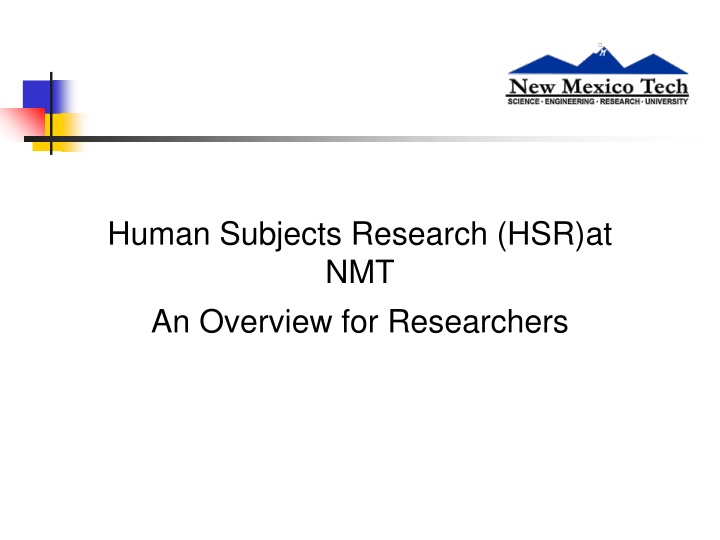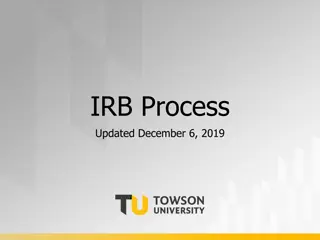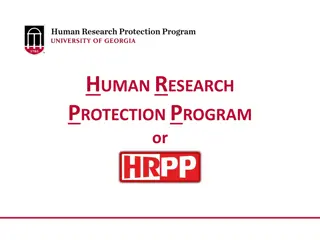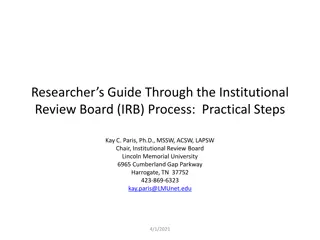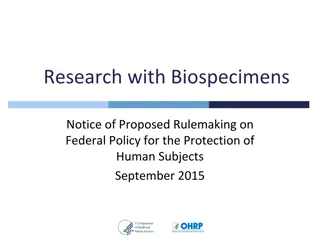Human Subjects Research at NMT: An Overview for Researchers
HSR must adhere to federal laws to ensure ethical treatment of participants. Learn about the history and regulations governing Human Subjects Research to conduct ethical studies.
Download Presentation

Please find below an Image/Link to download the presentation.
The content on the website is provided AS IS for your information and personal use only. It may not be sold, licensed, or shared on other websites without obtaining consent from the author.If you encounter any issues during the download, it is possible that the publisher has removed the file from their server.
You are allowed to download the files provided on this website for personal or commercial use, subject to the condition that they are used lawfully. All files are the property of their respective owners.
The content on the website is provided AS IS for your information and personal use only. It may not be sold, licensed, or shared on other websites without obtaining consent from the author.
E N D
Presentation Transcript
Human Subjects Research (HSR)at NMT An Overview for Researchers
Is it HSR? If you re working with quantities, counts, or tallies of items: Not Human Subjects Research. If you re interacting with people, even just a little bit: It s Human Subjects Research.
HSR must follow federal laws All Human Subjects Research must follow federal rules that dictate: Whether your project is approved. How you recruit participants How you treat participants How you store your data How you wrap up your project and dispose of your data.
Why were HSR laws enacted? Many HSR projects have been performed despite being unethical, hazardous, or even cruel. Many HSR projects caused severe harm to -- or even killed -- people who served as their subjects. Federal research funding increased significantly post-WWII, thus increasing the potential for abusive treatment of subjects.
Tuskegee Syphilis Study Black sharecroppers in Alabama were used to track the natural history of untreated syphilis infections. The research was specifically designed to track the course of the disease, NOT cure it. Ran from 1932 to 1972 continued well after drugs were available to cure syphilis infection.
Nazi and Japanese Atrocities during WWII Inmates of both Nazi and Japanese concentration camps during WWII were tortured under the guise of medical research. Exposed to diseases or extreme heat or cold, injected with toxins, surgery or vivisection without anesthetics, etc.
DOE Experiments Ionizing radionuclides were injected into or ingested by children and young adults without their knowledge or consent. Conducted under the guise of national security by the United States Atomic Energy Commission and Department of Energy during the Cold War.
History of Federal HSR Laws Federal laws governing HSR began in 1974 with the National Research Act. Other laws enacted throughout 1970s and 1980s Common Federal Policy for the Protection of Human Subjects ("Common Rule") passed in 1991, adopted by 16 federal agencies. The Common Rule currently governs federally-funded HSR in the United States.
A Basic Summary of The Common Rule ALL human subjects research conducted or funded by a Federal Department or Agency must be governed by an Institutional Review Board. (CFR Section 46.101) Federal Policy (Common Rule, Section 103a) states that "awardees and their collaborating institutions become engaged in human subjects research whenever their employees or agents (i) intervene or interact with living individuals for research purposes; or (ii) obtain, release, or access individually identifiable private information for research purposes."
How long does The Common Rule apply to a project? The rights and welfare of human subjects must be adequately protected during all phases of the research project, from inception through data collection, data analysis, writing up of results, and storage of the collected data at the project s completion.
Who actually protects human subjects in research? The Researcher training courses online to acquaint them with the ethics involved in HSR and federal laws governing HSR. The Institution, through a committee called an Institutional Review Board (IRB).
IRB responsibilities in HSR Must be familiar with the rights of participants in HSR projects. Must serve as the advocates for HSR participants -- not the institution or researcher(s). Must ensure that HSR participants are treated ethically and humanely during their participation in such research projects.
IRB responsibilities, cont. The IRB reviews all HSR projects conducted by Tech researchers whether student or faculty. All on-going research projects that involve human subjects are reviewed yearly, depending upon the level of risk.
Types of IRB Review Projects are reviewed based on Federal Regulations. Level of Review depends on: Type of Data being collected Level of Risk experienced by the subjects
Data Types Data requiring a higher level of review (Personally Identifiable Data): Name and/or SSN Contact Info Sensitive personal information Medical data Blood / Tissues / DNA
Definition of Risk Risk can be emotional or physical Low Risk: Anonymous surveys Moderate Risk: Blood draw High Risk: Some medical procedures Sensitive personal or medical information Can be very high-risk to person if information is revealed in the community
IRB Review Types Administrative for projects that do not collect personal information Expedited for projects that collect limited personal information Full-Board for projects using minors or projects that collect sensitive data
Forms and Documents https://www.nmt.edu/research/irb.php
Contact Information Email Application and Signature Form along with any surveys and consent documentation (Please NO paper) Administrator/Chairman: Val Thomas Research Compliance Officer Phone: 575-835-5749 Email: IRB@nmt.edu
